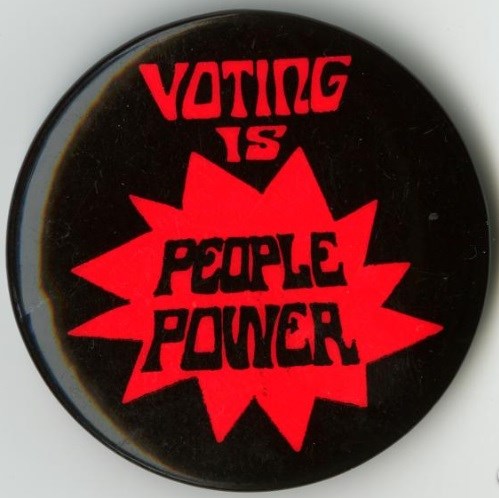Part of a series of articles titled Suffrage in America: The 15th and 19th Amendments.
Next: The Fifteenth Amendment
Article

National Museum of American History, Smithsonian Institution.
http://collections.si.edu/search/detail/edanmdm:nmah_1303137
In the United States, people have long fought to have their voices heard. One way of doing this is through voting. Voting is a way for us to express our opinions and choices. It is an opportunity for Americans to choose our leaders and have a say in important issues that affect our communities. The right to vote (also called suffrage or enfranchisement) means that Americans have the right to be heard.
Today, almost all American citizens aged 18 years and older have the right to vote. But throughout history, different groups were not allowed to take part in the voting process. At one point, women, people of color, and immigrants could not vote. People without money, property, or an education have also been prevented from voting. Only wealthy white men could make their voices heard in this particular way.
The original Constitution and Bill of Rights did not protect the right to vote. Instead, each state had its own laws about who could vote. We needed to establish who was an American citizen to have a uniform standard for voting eligibility. In 1868, the Fourteenth Amendment granted citizenship to everyone born or naturalized in the United States. Citizenship gives people privileges, immunities, equal protection, and due process of law. The Fifteenth Amendment of 1870 said that the government cannot keep a citizen from voting based on his "race, color, or previous condition of servitude". The purpose of this amendment was to enfranchise African American men. This left half of the American population unable to vote. It was not until 1920, when the Nineteenth Amendment forbid the denial of voting rights on the basis of sex, that women had the right to vote.
What does it mean to be a citizen?
Being a citizen comes with important rights, privileges, and responsibilities. A strong democracy depends on informed citizens who care about the welfare of others, their communities, and the world. The act of voting is one way that citizens can carry out their duties and create the society they want to live in.
Consider this:
How important is it to vote?
Is voting important in your family? Your community?
Part of a series of articles titled Suffrage in America: The 15th and 19th Amendments.
Next: The Fifteenth Amendment
Last updated: October 9, 2020